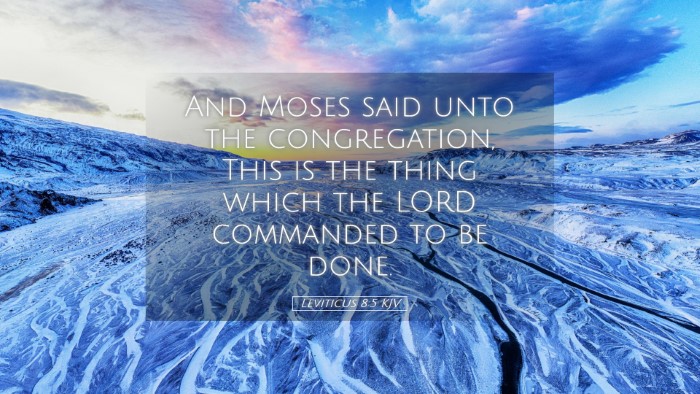Commentary on Leviticus 8:5
Text of Leviticus 8:5 (ESV): "And Moses said to the congregation, 'This is the thing that the LORD has commanded to be done.'
Introduction
The verse Leviticus 8:5 serves as a significant moment in the narrative of the Levitical priesthood's establishment. It highlights the obedience of Moses as a leader and the importance of divine command in the sacrificial and priestly system of ancient Israel. Public domain commentaries offer varied insights, emphasizing the theological, historical, and practical implications of this verse for believers.
The Authority of Divine Command
Matthew Henry's Commentary:
Matthew Henry emphasizes that the statement made by Moses reflects a critical aspect of leadership in spiritual matters. He notes that Moses conveys God’s commands with a sense of authority. This underscores the necessity for leaders to adhere strictly to divine will and make known the requirements of the Lord to the congregation.
Henry points out that here, the act of Moses is not a mere suggestion but a clear proclamation of God’s orders. He remarks that every instruction given is vital, drawing a parallel to how modern congregations should perceive God’s word as an ultimate guide for both personal and communal conduct.
Significance of the Congregation
Albert Barnes' Notes:
Albert Barnes provides insight into the role of the congregation in this verse. He argues that Moses addresses the assembly, which signifies the collective responsibility of the people of Israel to respond to God's commands. This address serves to unify the people under the statutes God has set forth.
According to Barnes, the statement acts as a reminder that obedience to God is not only an individual responsibility but a communal one. He stresses the importance of active engagement of the congregation in understanding and executing God’s directives, thus establishing a framework for worship and relationship with God.
The Context of Priestly Consecration
Adam Clarke's Commentary:
Adam Clarke contextualizes Leviticus 8:5 within the broader narrative of the consecration of Aaron and his sons as priests. He notes that this passage marks a pivotal moment of transition from the general priesthood of all Israel to a specific lineage that would serve as mediators between God and the people. Clarke points out that the phrase "this is the thing that the LORD has commanded" indicates the solemnity and importance of the consecration ritual being described.
He also highlights that such consecration is indicative of God's choice and establishment of a priestly lineage. This act not only serves to fulfill God’s plan but also provides a template for future generations about the structure and authority of spiritual leadership in Israel.
Theological Implications
The Divine Call to Service:
The call for consecration as portrayed in this verse reveals that service to God is both a privilege and a responsibility. Leaders, whether in ancient Israel or contemporary settings, must recognize the weight of their calling. The verse emphasizes the necessity of obedience to God’s commands and reflects on the sacredness of the priestly duties that are being instituted.
Practical Applications for Modern Believers
- Alignment with God's Will: Just as Moses instructed the people regarding God’s commands, contemporary believers must seek to understand and align their lives with Scripture.
- Importance of Community: The verse underscores that faith is not merely an individual journey; church members should encourage and instruct one another in godly living.
- Respect for Leadership: Just as Moses was tasked with communicating God’s commands, modern leaders within the church should be respected when they lead in accordance with biblical principles.
- Preparation for Service: Followers of Christ are called into service. Just as Aaron and his sons were consecrated, believers today should prepare themselves spiritually for their roles in the church.
Conclusion
Leviticus 8:5 offers profound insight into the establishment of divine order and authority in worship and service. By understanding the context in which Moses speaks, as well as the implications for both the ancient Israelites and modern believers, we deepen our appreciation for God’s character and His desire for a structured relationship with humanity. The teachings gathered from the commentaries of Henry, Barnes, and Clarke converge on a common theme: the necessity of obedience to God’s commands, the importance of community in faith, and the sanctity of those called to serve God.


